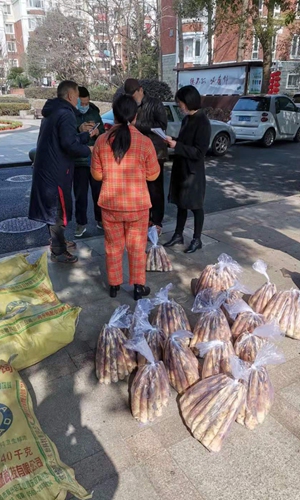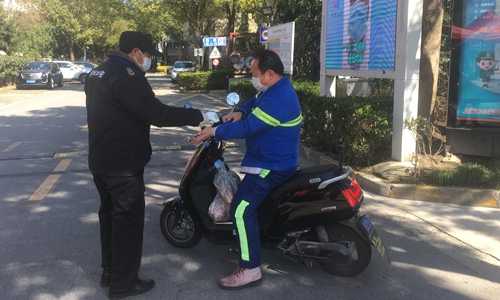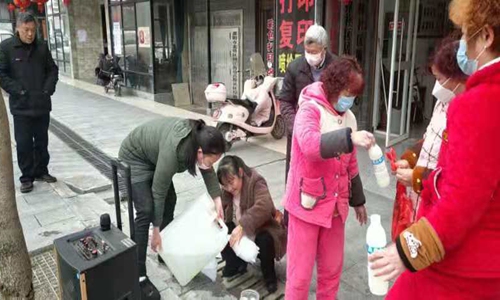HOME >> CHINA
Residential communities across China vary in grassroots coronavirus prevention and control
By GT staff reporters Source: Published: 2020/2/18 19:48:33
A controversial video clip recently caused a debate on the improper behavior that occasionally happens among local level volunteers in fighting the novel coronavirus COVID-19.
In the clip, a family of three was playing mahjong at home when some people, said to be patrolling volunteers, broke into the house, destroyed the mahjong table and beat a member.
“You mustn’t (gather to) play mahjong at this time,” shouted a volunteer in the video, implying that gathering may increase the risk of virus transmission. He neglected the fact that the family members had been living together.
Even though details about the video including its time, place and background, remain unknown, the public was enraged by the overreaction and rude behavior of the volunteers.
Amid the video going viral, the Global Times visited or talked to a few residential communities across the country to explore the actual situation of virus prevention and control in the grassroots.

Residents give thumbs-up in Zhejiang
In Hangzhou, East China’s Zhejiang Province, resident Sheng Rongrong enjoys conveniences that her West Nandu Dejia residential community brings during the virus outbreak.
Days ago, when the city’s transport and logistics services partly suspended, Sheng’s community proactively helped residents buy food.
It negotiated with some farmers in suburban Lin’an district, a local producing area of bamboo shoots, to provide its residents fresh bamboo shoots at 10 yuan per kilogram – one fourth the market retail price, Sheng said.
Sheng praised the community’s thoughtfulness that benefited the residents and farmers. “We enjoyed fresh and cheap bamboo shoots, and the farmers didn’t have to worry about a lack of sales,” she told the Global Times Tuesday.
The community has helped buy 1,100 kilograms bamboo shoots as well as rice and eggs for its over 500 households. These items were transported to the community by the sellers or some kindhearted residents, Sheng said.
Xun Xiaoxiao, director of Wujiang residential community in Hangzhou, affirmed the importance of more friendly methods of management in fighting the virus.
Some irrational measures taken by grassroots management, like forcing all small shops to shut down, will hurt people’s feelings, Xun said.
“People might wonder why the community and people have become so strange and indifferent,” she told the Global Times Tuesday.
To bring residences conveniences, Xun said her community encourages nearby small shops including barber shops, fresh stores and convenience stores to open as soon as possible in the premise and carry out disinfection regularly and abide by epidemic control measures.

Situations vary even in Shanghai
In front of Sanyuan Jidiyuan residential community in Jiading district, a white car was stopped when trying to enter.
“The license is not registered. You must wait outside and call the resident out,”said Wu Lixue. After detecting another outside car, Wu ran to the gate and asked the car to stop.
Originally from East China’s Anhui Province, Wu has been working as a security guard for the community for a year. Due to the virus outbreak he had to cancel his family reunion during the Chinese New Year holiday and stand at the frontline to safeguard the compound.
“Since the coronavirus outbreak, the job has been busier. I have to walk around all day with no time to sit down except the 30-minute lunch break,” Wu said, adding that he has been working nonstop since January 24.
At another residential community in Pudong New Area, however, a Global Times reporter walked in on Tuesday without being stopped, even though the community had claimed to measure temperatures and check the ID card of every entering person.
Many local communities ask their residents who had been out of Shanghai during the vacation to report their travel histories the first time they return. But Xu, a resident of this Pudong community who had been back for nearly three weeks, said he hadn’t received any calls or messages from the community.
Eventually, Xu himself reported his travel history and health condition to the community last week.
“I don’t think they (community staffers) care about us very much,” he told the Global Times Tuesday.

Case by case in Shaanxi
After handing over a certificate issued by his company to his Dongfang Shangcheng residential community, Jia Yong, a resident in Xi’an city of Northwest Shaanxi Province, was finally able to resume work on February 10.
The certificate is meant to promise that the company will ensure disinfection and epidemic control in its work environment and employees, Jia told the Global Times Tuesday.
To get out of the community to the factory, which is only five kilometers away, Jia has to show an entrance pass to the community security guard, which has both stamps of his community and his company on it. Meanwhile, he has to carry his ID card with him all the time for random checking.
“For those who don’t go to work, each household is given only one pass, which allows one person to come out one time every two days and only for two hours,” Jia noted.
The community in Shaanxi’s Baoji city that resident Ren Yangmei lives in, by contrast, takes a much easier attitude on epidemic control.
“Many measures of our community are lagging behind,” Ren complained, adding that the community didn’t take any action at the beginning of the outbreak.
After the community staffers started reacting to the virus, some of their methods were just rude in Ren’s eyes. “They simply shut down the community’s garage to ban cars from parking,” Ren told the Global Times Tuesday.
As a result, residents had to gather in front of the garage entrance to protest, which later forced the community to reopen the garage.
Satisfaction in Hunan
At Gaocheng residential community in Shaoyang city, Central China’s Hunan Province, residents receive photos of community staffers disinfecting the elevators via WeChat every day.
“They also prepare paper napkins in the elevators for passengers,” resident Yin Biling said. “By wrapping my fingers with napkins, I don’t have to worry about the possible infection through pushing the buttons.”
Yin’s community closed two of its three gates during the virus outbreak. Only people with entry passes are allowed to enter, and their temperatures are checked by the security guards at the entrance, Yin said.
“I feel I’m well protected,” she told the Global Times Tuesday.
The community has provided 1,800 kilograms of disinfectants for free, said a community staffer Zeng Xuncao. “No matter residents, security guards or nearby shop staffers, they are all welcome to get free disinfectants from us,” he added.
The community collects the information of residents with abnormal temperatures to find out possible COVID-19 patients. “When someone with a fever enters the community or buys febrifuge from surrounding pharmacies, we will know and respond to it the first time,” Zeng told the Global Times Tuesday.
Tenants unfriendly in Anhui
Under “closed-off management,” the underground parking garages have been closed for days, according to Liu, who is living at a 2,000-household residential community located in the suburb of Hefei, Anhui Province. The community working staff will disinfect their cars parked in outdoor parking lots.
“Residents who need to work every day should bring the related resumption certifications by their firms to get access permits,” Liu told the Global Times on Tuesday.
Anyone entering or going out of the community will have their temperature checked and information registered, Liu said. “Tenants are not allowed to enter the community,” Liu noted.
In the clip, a family of three was playing mahjong at home when some people, said to be patrolling volunteers, broke into the house, destroyed the mahjong table and beat a member.
“You mustn’t (gather to) play mahjong at this time,” shouted a volunteer in the video, implying that gathering may increase the risk of virus transmission. He neglected the fact that the family members had been living together.
Even though details about the video including its time, place and background, remain unknown, the public was enraged by the overreaction and rude behavior of the volunteers.
Amid the video going viral, the Global Times visited or talked to a few residential communities across the country to explore the actual situation of virus prevention and control in the grassroots.

West Nandu Dejia residential community helps buy bamboo shoots for its residents (courtesy of the community)
Residents give thumbs-up in Zhejiang
In Hangzhou, East China’s Zhejiang Province, resident Sheng Rongrong enjoys conveniences that her West Nandu Dejia residential community brings during the virus outbreak.
Days ago, when the city’s transport and logistics services partly suspended, Sheng’s community proactively helped residents buy food.
It negotiated with some farmers in suburban Lin’an district, a local producing area of bamboo shoots, to provide its residents fresh bamboo shoots at 10 yuan per kilogram – one fourth the market retail price, Sheng said.
Sheng praised the community’s thoughtfulness that benefited the residents and farmers. “We enjoyed fresh and cheap bamboo shoots, and the farmers didn’t have to worry about a lack of sales,” she told the Global Times Tuesday.
The community has helped buy 1,100 kilograms bamboo shoots as well as rice and eggs for its over 500 households. These items were transported to the community by the sellers or some kindhearted residents, Sheng said.
Xun Xiaoxiao, director of Wujiang residential community in Hangzhou, affirmed the importance of more friendly methods of management in fighting the virus.
Some irrational measures taken by grassroots management, like forcing all small shops to shut down, will hurt people’s feelings, Xun said.
“People might wonder why the community and people have become so strange and indifferent,” she told the Global Times Tuesday.
To bring residences conveniences, Xun said her community encourages nearby small shops including barber shops, fresh stores and convenience stores to open as soon as possible in the premise and carry out disinfection regularly and abide by epidemic control measures.

Liu Lixue checks the temperature of a resident (Photo: Qi Xijia/GT)
Situations vary even in Shanghai
In front of Sanyuan Jidiyuan residential community in Jiading district, a white car was stopped when trying to enter.
“The license is not registered. You must wait outside and call the resident out,”said Wu Lixue. After detecting another outside car, Wu ran to the gate and asked the car to stop.
Originally from East China’s Anhui Province, Wu has been working as a security guard for the community for a year. Due to the virus outbreak he had to cancel his family reunion during the Chinese New Year holiday and stand at the frontline to safeguard the compound.
“Since the coronavirus outbreak, the job has been busier. I have to walk around all day with no time to sit down except the 30-minute lunch break,” Wu said, adding that he has been working nonstop since January 24.
At another residential community in Pudong New Area, however, a Global Times reporter walked in on Tuesday without being stopped, even though the community had claimed to measure temperatures and check the ID card of every entering person.
Many local communities ask their residents who had been out of Shanghai during the vacation to report their travel histories the first time they return. But Xu, a resident of this Pudong community who had been back for nearly three weeks, said he hadn’t received any calls or messages from the community.
Eventually, Xu himself reported his travel history and health condition to the community last week.
“I don’t think they (community staffers) care about us very much,” he told the Global Times Tuesday.

Gaocheng residential community provides residents with free disinfectant (courtesy of Zeng Xuncao)
Case by case in Shaanxi
After handing over a certificate issued by his company to his Dongfang Shangcheng residential community, Jia Yong, a resident in Xi’an city of Northwest Shaanxi Province, was finally able to resume work on February 10.
The certificate is meant to promise that the company will ensure disinfection and epidemic control in its work environment and employees, Jia told the Global Times Tuesday.
To get out of the community to the factory, which is only five kilometers away, Jia has to show an entrance pass to the community security guard, which has both stamps of his community and his company on it. Meanwhile, he has to carry his ID card with him all the time for random checking.
“For those who don’t go to work, each household is given only one pass, which allows one person to come out one time every two days and only for two hours,” Jia noted.
The community in Shaanxi’s Baoji city that resident Ren Yangmei lives in, by contrast, takes a much easier attitude on epidemic control.
“Many measures of our community are lagging behind,” Ren complained, adding that the community didn’t take any action at the beginning of the outbreak.
After the community staffers started reacting to the virus, some of their methods were just rude in Ren’s eyes. “They simply shut down the community’s garage to ban cars from parking,” Ren told the Global Times Tuesday.
As a result, residents had to gather in front of the garage entrance to protest, which later forced the community to reopen the garage.
Satisfaction in Hunan
At Gaocheng residential community in Shaoyang city, Central China’s Hunan Province, residents receive photos of community staffers disinfecting the elevators via WeChat every day.
“They also prepare paper napkins in the elevators for passengers,” resident Yin Biling said. “By wrapping my fingers with napkins, I don’t have to worry about the possible infection through pushing the buttons.”
Yin’s community closed two of its three gates during the virus outbreak. Only people with entry passes are allowed to enter, and their temperatures are checked by the security guards at the entrance, Yin said.
“I feel I’m well protected,” she told the Global Times Tuesday.
The community has provided 1,800 kilograms of disinfectants for free, said a community staffer Zeng Xuncao. “No matter residents, security guards or nearby shop staffers, they are all welcome to get free disinfectants from us,” he added.
The community collects the information of residents with abnormal temperatures to find out possible COVID-19 patients. “When someone with a fever enters the community or buys febrifuge from surrounding pharmacies, we will know and respond to it the first time,” Zeng told the Global Times Tuesday.
Tenants unfriendly in Anhui
Under “closed-off management,” the underground parking garages have been closed for days, according to Liu, who is living at a 2,000-household residential community located in the suburb of Hefei, Anhui Province. The community working staff will disinfect their cars parked in outdoor parking lots.
“Residents who need to work every day should bring the related resumption certifications by their firms to get access permits,” Liu told the Global Times on Tuesday.
Anyone entering or going out of the community will have their temperature checked and information registered, Liu said. “Tenants are not allowed to enter the community,” Liu noted.
Posted in: SOCIETY